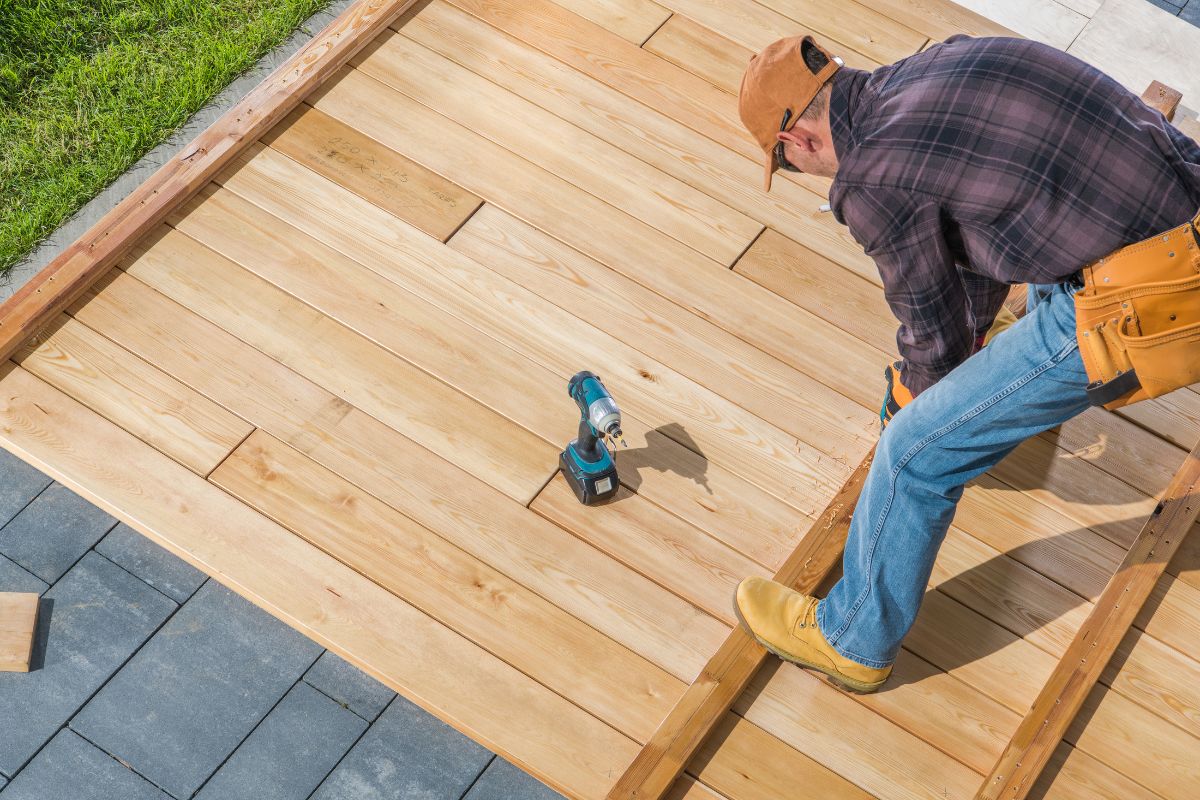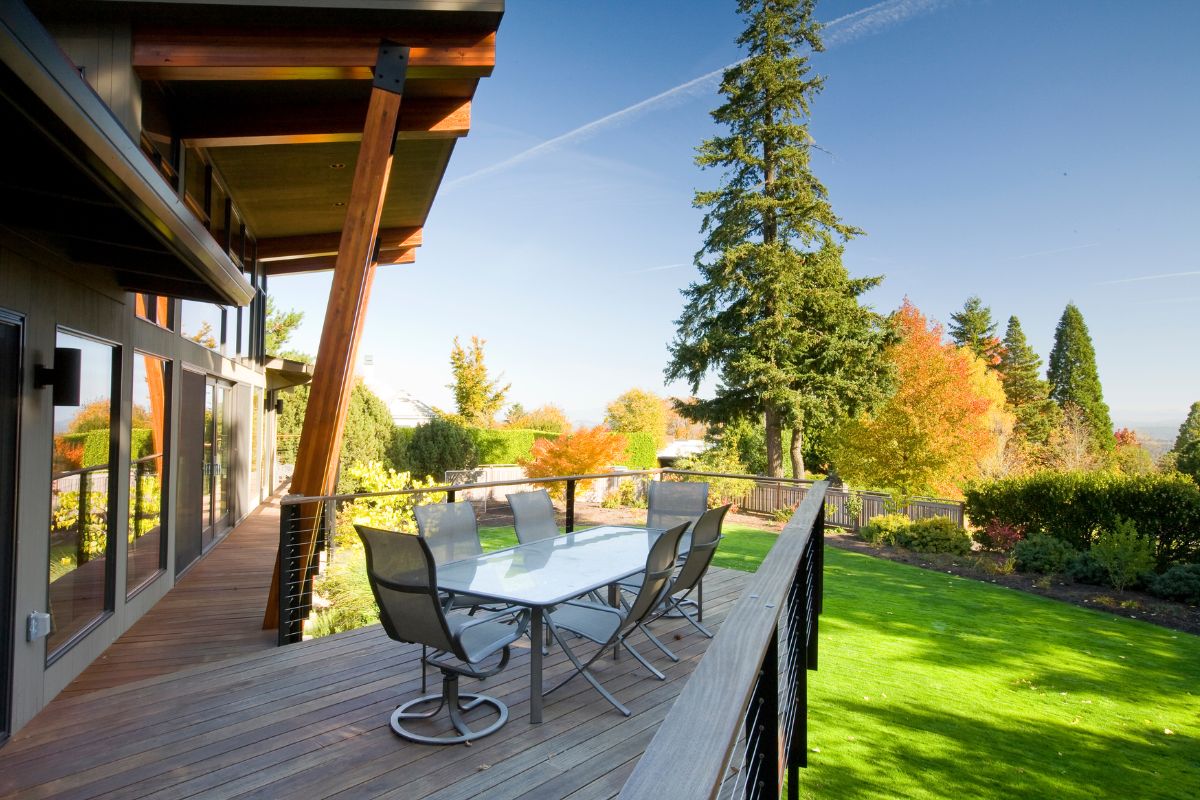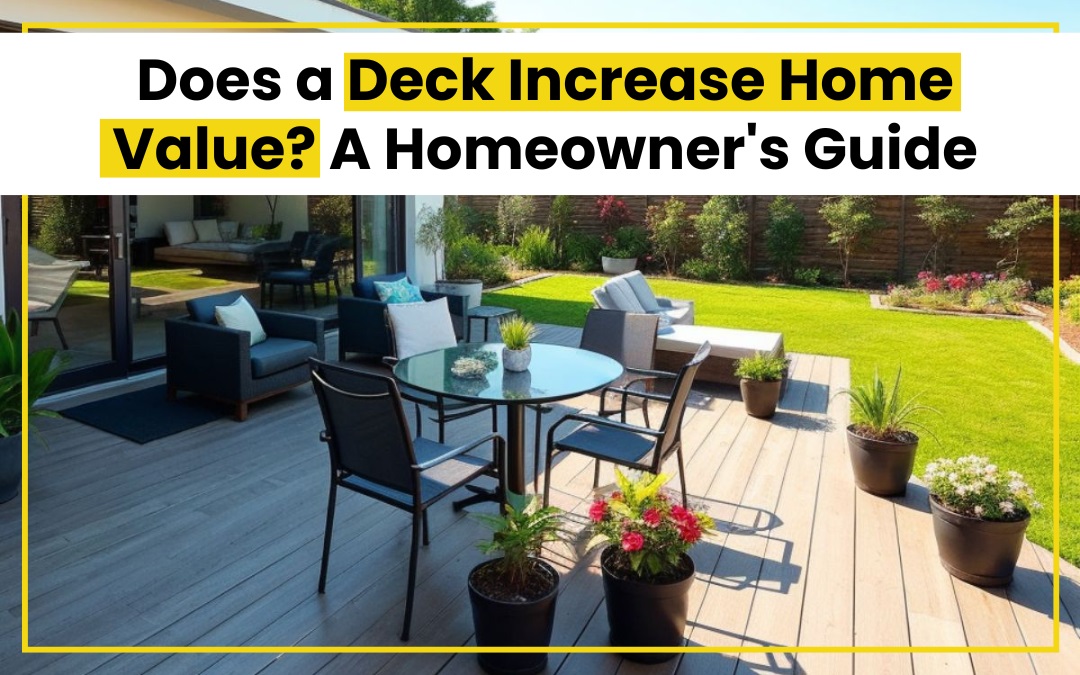If you’ve ever wondered whether adding a deck could make a difference in your home’s value, the answer is a resounding yes!
Decks offer a perfect blend of functional outdoor living and financial return. Homeowners are increasingly turning to decks to enhance their homes—not just for their enjoyment but also to boost property value when it’s time to sell.
In this article, we’ll dive into how much value a deck can add to your home and what factors influence its return on investment, so you can decide if this is the right project for you.
Looking to increase your home’s value and create an inviting outdoor area? Perimeter Remodeling specializes in building beautiful, custom decks that perfectly blend style and function. Let’s turn your vision into reality with a deck that enhances your home’s appeal.
How Much Value Can a Deck Add to Your Home?

A deck can be a great investment when it comes to boosting your home’s value. According to various reports, adding a deck offers an average return on investment (ROI) of 70-76%. This means that while you may not recoup the full cost, a significant portion of your investment will come back when you sell your home.
Compared to other common home renovations, a deck holds its own:
- Deck: 70-76% ROI
- Patio: Close to 100% ROI
- Entry door replacement: 101% ROI
- Window replacement: 61% ROI
While patios may offer a slightly higher ROI, decks provide a different kind of value: the enjoyment of having a functional, beautiful outdoor space. The lifestyle benefits, like relaxing, hosting gatherings, or simply enjoying nature, often outweigh the financial return.
So, even if you don’t recoup every dollar, the daily use and personal enjoyment make adding a deck a rewarding choice for many homeowners.
Factors Influencing Deck Value
Several factors impact how much value a deck can add to your home. From the materials you choose to the location of your property, these elements play a key role in determining your deck’s ROI.
Materials Used
The type of deck material you choose significantly affects its value. Wood decking is a popular choice due to its affordability and high demand in the market. It gives a natural look and typically offers a higher resale value.
On the other hand, composite decking, while more expensive upfront, requires less maintenance over time. It resists weathering, rotting, and insect damage, making it a better long-term investment for homeowners looking for durability.
- Wood: Lower cost, higher demand, but more upkeep.
- Composite: Higher cost, less maintenance, and longer lifespan.
Location
Where you live can also affect how much value a deck adds to your home. Decks tend to provide higher returns in regions with warmer climates or where outdoor living is a significant part of the lifestyle.
Homes in states like California, Florida, and Texas, where people spend more time outdoors year-round, generally see a higher ROI on decks. In contrast, colder regions might not get as much value since buyers may use decks for fewer months each year.
Size and Design
The size and design of your deck also play a role in its value. Larger decks offer more space for outdoor activities, which can appeal to buyers, but they also come with higher building costs.
Design features such as multi-level decks or wraparound decks can further increase your home’s appeal. These elements create more usable space and make the deck feel like an extension of the home, boosting its perceived value.
- Larger decks: More value, higher cost.
- Multi-level or wraparound decks: Add visual interest and functionality, increasing ROI.
Cost Considerations and ROI
When considering adding a deck to your home, it’s essential to understand the potential costs involved.
Generally, building a deck can range from $4,000 to $23,000, depending on various factors such as size, materials, and design complexity.
These costs are typically split between materials and labor, with materials often accounting for about 50% of the total expense.
For instance, if you’re looking at a project costing $10,000, approximately $5,000 would go toward materials, and the remaining $5,000 would cover labor costs.
Homeowners can strike a balance between cost and quality by carefully selecting materials and features that fit within their budget. Here are some tips to consider:
- Choose the Right Materials: Opt for cost-effective materials like treated wood if you’re on a tighter budget. Composite decking may be pricier but offers long-term savings with lower maintenance.
- Consider Size and Design: A smaller, simpler deck design can help keep costs down while still providing functional outdoor space.
- Plan for Climate: Select materials that suit your local climate. For example, in humid areas, composite materials may perform better, saving you on repairs and maintenance in the long run.
By evaluating these factors, homeowners can make informed decisions that maximize both their enjoyment of the deck and its return on investment.
Maintenance and Longevity of Decks

The maintenance requirements of your deck can significantly impact its longevity and overall cost-effectiveness. Understanding the differences between wood and composite decking is crucial for making the right choice for your home.
Wood Decking
Wood decks, while beautiful and classic, require regular maintenance to keep them in good shape. Here’s how you can clean wooden decks properly:
- Annual cleaning: You’ll need to scrub the surface and remove debris to prevent mold and mildew.
- Sealing and staining: To protect against weathering, wood decks should be sealed every 1-2 years, which can cost anywhere from $500 to $1,500 depending on the size of the deck.
- Repairs: Over time, wood can splinter, rot, or be damaged by pests, leading to potential replacement costs.
While wood is initially more affordable, the upkeep can add up over the years, especially if you plan to stay in your home long-term.
Composite Decking
In contrast, composite decking is designed to be low-maintenance and durable. Its benefits include:
- Minimal upkeep: Composite materials typically require only occasional cleaning with soap and water.
- No sealing or staining: Unlike wood, composite decks don’t need regular sealing, saving you both time and money.
- Longevity: Composite decking can last 25 years or more without significant deterioration, making it a great long-term investment.
For homeowners planning to stay in their homes, choosing low-maintenance materials like composite decking can be more cost-effective in the long run.
While the upfront costs may be higher, the reduced need for repairs and maintenance makes composite decking a smart choice for enjoying your outdoor space without the hassle.
Deck vs. Patio: Which Adds More Value?
When considering outdoor improvements, many homeowners wonder whether a deck or a patio will offer a better return on investment (ROI). Generally, decks tend to provide an ROI of around 70%, while patios often come in closer to 100%. This difference can influence your decision based on your goals for home improvement.
Return on Investment
- Deck: Approximately 70% ROI. Decks are valued for their aesthetic appeal and functionality, especially in homes where outdoor living is prioritized.
- Patio: Often closer to 100% ROI. Patios are generally less expensive to install and can recoup nearly the full cost when it comes time to sell.
Choosing the Right Option
The choice between a deck and a patio may depend on several factors, including the type of home, climate, and buyer preferences.
- Type of Home: Decks can enhance homes with scenic views, elevated spaces, or sloped lots. Patios work well for homes with ample yard space on level ground.
- Climate: In warmer climates, decks may be more appealing as they provide a shaded area to enjoy the outdoors. Conversely, in regions with harsh winters or less predictable weather, patios may offer a more stable option for outdoor gatherings.
- Buyer Preferences: If potential buyers in your area tend to favor outdoor entertaining, a well-designed deck may add more allure. However, if buyers appreciate low-maintenance options or outdoor dining spaces, a patio might be the better choice.
Ultimately, both decks and patios can significantly enhance your home’s value and appeal. Assess your specific needs, preferences, and local market trends to determine which option aligns best with your vision for outdoor living.
Tips to Maximize Your Deck’s Value

To ensure your deck adds the maximum possible value to your home, consider these practical tips. From enhancing its functionality to maintaining its appearance, small changes can make a big difference in how potential buyers perceive your outdoor space.
Adding Built-in Features
Enhancing your deck with built-in features can significantly boost its usability and appeal. Consider adding:
- Built-in seating: This creates more space for guests and can be integrated into the deck design.
- Lighting: Strategically placed lights not only enhance the ambiance but also improve safety for evening gatherings.
- Fire pits: A fire pit offers warmth and a cozy atmosphere, making your deck a year-round gathering spot.
These features not only make your deck more inviting but also increase its value by appealing to buyers looking for functional outdoor living spaces.
Proper Maintenance and Repairs
Keeping your deck well-maintained is crucial to preserving its value. Regular inspections and maintenance help ensure the structure remains safe and visually appealing. See more on our deck maintenance checklist.
- Check for rot or damage: Address any issues promptly to avoid larger, more expensive repairs later.
- Clean regularly: Regular cleaning prevents dirt buildup and maintains the deck’s aesthetic appeal.
By committing to ongoing maintenance, you demonstrate to potential buyers that the deck is a valuable and cared-for asset.
Marketing Your Deck
When it’s time to sell your home, don’t forget to highlight your deck’s features in your marketing materials.
- Showcase its unique elements: Include photos that highlight built-in seating, lighting, and any other special features in your listings.
- Emphasize functionality: Mention how the deck is ideal for entertaining, relaxation, or family gatherings.
By effectively marketing your deck, you can attract buyers who appreciate the added value of an appealing outdoor space, ultimately boosting your home’s resale potential.
Ready to Transform Your Outdoor Space? Partner with Us for Your Dream Deck!
Adding a deck to your home can significantly enhance both your enjoyment of outdoor living and its overall resale value.
With the right materials and design, a deck provides a functional space for relaxation and entertainment, making it a desirable feature for potential buyers.
While the return on investment may vary, the lifestyle benefits and aesthetic appeal of a deck often make it a worthwhile addition to your property.
As you consider whether a deck is a smart investment for your home, take the time to assess your needs, location, and budget. Think about how you envision using the space, the climate in your area, and the financial implications.
By carefully evaluating these factors, you can make an informed decision that maximizes both your enjoyment and the value of your home for years to come.
At Perimeter Remodeling, we are committed to helping you design and build the perfect deck that complements your home and lifestyle. Our dedicated team will work closely with you, from the initial concept to the final touches, ensuring every detail aligns with your vision.
Ready to take the next step toward your dream deck? Contact us today for a free consultation, and let’s bring your outdoor living ideas to life together!



Recent Comments